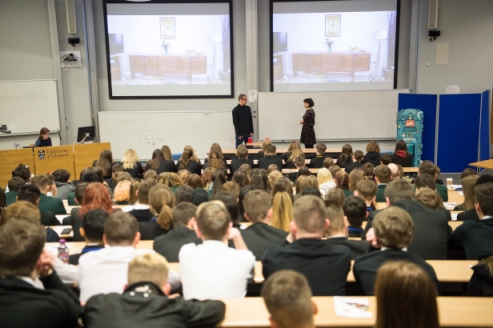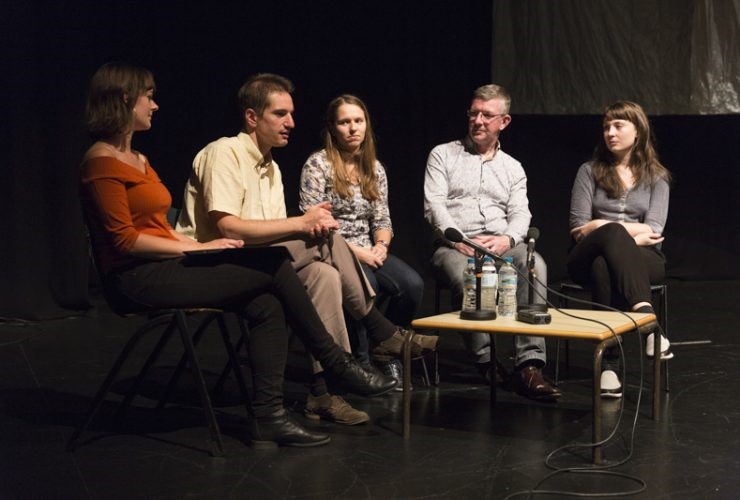Objectives
- To support collaboration between engineering and the arts and develop highly engaging content by bringing together engineers, STEM engagement experts, local artists and theatre researchers
- To develop one engineering-themed educational show, produced by Glasgow Science Festival with University of Glasgow engineers and targeted to secondary pupils and an adult audience
- To develop two or more engineering-inspired performance pieces, produced by University of Glasgow MLit Theatre students with University of Glasgow engineers and targeted to adults who do not usually engage with engineering
- To develop engineers' communication and engagement skills through provision of training sessions in public engagement and social media and events promotion
- To promote shared learning between engineers and the arts community through delivery of 'taster' show and workshop for engineers and writers
- To enable engineers to apply engagement skills, reaching diverse audiences through participation in 6-10 public events, targeted to adults/secondary schools.
- To connect with school pupils through positive learning experiences, encouraging recruitment into engineering, through six free engineering-themed shows for up to 900 pupils
- To create platforms that enable two-way communication between engineers and the public, through delivery of eight or more 'Imagineer' public debate sessions
Background
In 2016, a multi-disciplinary workshop held in Glasgow brought together artists, scientists and engineers to discuss how the world may look in the future. The conclusions were fascinating, but what really stood out, was how much more optimistic engineers were about the future compared to non-engineers. Prof Colin McInnes shared this observation with Dr Zara Gladman from Glasgow Science Festival and Professor of Theatre and Performance Carl Lavery; the group decided that this would be an exciting topic to explore in public outreach and theatre.
Audience
The project had three target audiences: school pupils, their teachers and adults with no experience of engineering. The project successfully engaged with all these groups, thanks in particular to a huge response from schools, which allowed the project to reach over 1,000 pupils. Schools in disadvantaged areas were particularly encouraged to attend to ensure that the project reached audiences that might not traditionally engage with engineering, with bus travel subsidised. The project also attracted over 100 teachers, of whom around 30 came from schools in areas of multiple deprivation. Finally, the project sought to reach out to adults who do not traditionally engage with engineering, and reached over 300, of whom 80% had no engineering background.


The Project
After receiving an Ingenious grant, the Imagineer team, supported by Professor Colin McInnes and facilitated by Glasgow Science Festival, brought together engineers and theatre students from performance collective ’The Doing Group‘ for a series of networking laboratory tours and discussion. Th discussion informed the production of two engineering-inspired performances, titled ‘Unphysical Things’
‘The Doing Group’ performed these shows to a mixed audience of theatre fans, engineers and the general public at Glasgow’s James Arnott Theatre. Performances were followed by a debate and panel discussion, which ranged from ethical considerations in engineering to the changed nature of engineering from the physical (e.g. shipbuilding, laboratory experiments) to the virtual (e.g. software engineering, mathematic modelling). The discussions featured engineers Maira Vasilevska, Dr Julien Reboud, Professor Colin McInnes and theatre-maker Christiana Bissett.
Imagineer then moved into its second phase in which the team developed an educational theatre show that would target engineers of the future: secondary school pupils. The Imagineer show was then performed by Emily Benita and Ross Somerville to over 1,000 school pupils at the James Arnott Theatre, with one public performance aimed at adults. Each performance was coupled with a Q&A session led by engineers. Engineers were provided with public engagement training and social media training ahead of these public events, to build confidence and aid promotion of the project to a wide audience.
With the project now complete the Glasgow Science Festival team produced a post-show schools resource for distribution to the pupils who attended the shows. This included answers to the most popular questions asked by pupils during the engineering Q&As, such as “why did you choose to become an engineer?” to “when and how will robots take over?”
Impact summary
The Imagineer project had two main strands of engagement: The Doing Group shows and the Glasgow Science Festival show. Of those who attended The Doing Group shows, 87% enjoyed the show and nearly 70% were inspired to find out more about engineering. These events were particularly useful in stimulating debate around issues in engineering, such as ethics, between members of the public and engineers. Data from Imagineer events demonstrates that these shows were particularly well received with all of those who attended saying they would recommend the event and 85% were inspired to find out more about engineering.
Learning
The most successful elements of this project were the collaborative parts, for example, bringing members of the arts community and STEM community together. By involving a range of disciplines, this offered new perspectives and injected some creativity and fun into the project, which translated into more effective public engagement. The music video was particularly well received the combination of music, comedy and STEM enthused the teenage audience the most. Below, there is a list of areas of learning othe Public Engagement projects could learn from;
- The Q&A format had to be adapted for a teenage audience, taking account of the reluctance of teenagers to speak in front of their peers. Questions were collected from pupils prior to the start of the event and read out by GSF staff for engineers to respond to.
- A hands-on activity to accompany the show and debate would have provided an additional method of engagement that may have appealed to the learning style of some pupils
More information can be found on the Glasgow Science Festival website.
